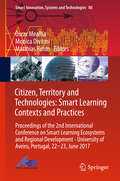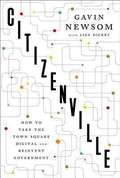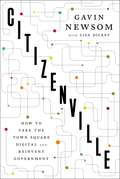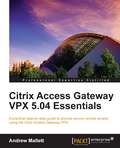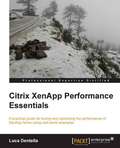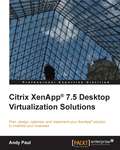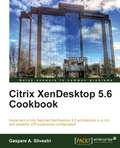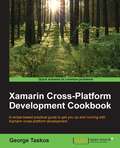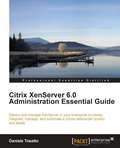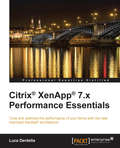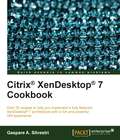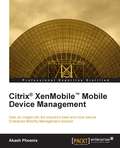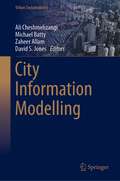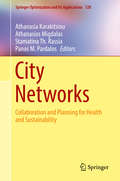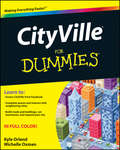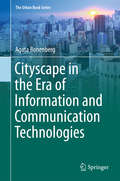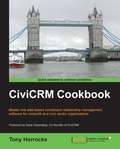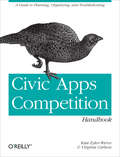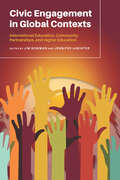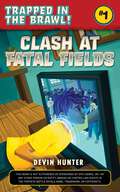- Table View
- List View
Citizen, Territory and Technologies: Proceedings of the 2nd International Conference on Smart Learning Ecosystems and Regional Development - University of Aveiro, Portugal, 22-23, June 2017 (Smart Innovation, Systems and Technologies #80)
by Óscar Mealha Monica Divitini Matthias RehmThis book gathers a selection of the articles accepted for presentation and discussion at the 2nd International Conference on Smart Learning Ecosystems and Regional Developments (SLERD 2017), held 22-23 June What characterizes smart learning ecosystems? What is their role in city and regional development and innovation? How can we promote the engagement of citizens in smart learning ecosystems? These are some of the questions addressed at SLERD 2017 and documented here. The proceedings include scientific papers that endeavor to understand, devise and promote innovative human-centric design and development methods, education/training practices, informal social learning, and citizen-driven policies. The individual papers elaborate on the notion of smart learning ecosystems, study the relation of smart learning ecosystems with As such, they help to foster the social innovation sectors, Information and Communication Technology (ICT) and economic development and deployment strategies, alongside new policies for smarter, proactive citizens - making them a valuable resource for researchers and policymakers alike.
Citizenville
by Gavin Newsom"Citizenville offers both an impassioned plea for more tech-enabled government and a tour d'horizon of the ways some governments have begun using technology to good effect... a fast-paced and engaging read” --San Francisco Chronicle A rallying cry for revolutionizing democracy in the digital age, Citizenville reveals how ordinary Americans can reshape their government for the better. Gavin Newsom, the lieutenant governor of California, argues that today’s government is stuck in the last century while-in both the private sector and our personal lives-absolutely everything else has changed. The explosion of social media, the evolution of Internet commerce, the ubiquity of smart phones that can access all the world’s information; in the face of these extraordinary advances, our government appears increasingly irrelevant and out of touch. Drawing on wide-ranging interviews with thinkers and politicians, Newsom’s Citizenville shows how Americans can transform their government, taking matters into their own hands to dissolve political gridlock even as they produce tangible changes in the real world. When local Web designers wanted to prevent muggings in Chicago and Oakland, they created innovative crime-mapping tools using public police data. When congressional representatives wanted citizens’ input on new legislation, they used interactive blogging tools to invite public comments and changes. When a town in Texas needed to drum up civic engagement, officials invented a local digital "currency” to reward citizens for participating in government-making small-town politics suddenly as fun and addictive as online games such as Farmville. Surveying the countless small advances made by ordinary Americans in reinventing government for the twenty-first century, Newsom unveils a path for American prosperity and democratic vitality. Newsom explains how twenty-first-century problems are too big and too expensive for the government simply to buy solutions; instead, Americans must innovate their way out. Just as the post office and the highway system provide public infrastructure to channel both personal and private enterprise-a platform upon which citizens can grow-so too could a modern digital government house the needs, concerns, information, and collaboration of an enlightened digital citizenry. A vision for better government that truly achieves the ancient goal of commonwealth and a triumphant call for individuals to reinvigorate the country with their own two hands, Citizenville is a timely road map for restoring American prosperity and for reinventing citizenship in today’s networked age. .
Citizenville: How to Take the Town Square Digital and Reinvent Government
by Lisa Dickey Gavin Newsom"Citizenville offers both an impassioned plea for more tech-enabled government and a tour d'horizon of the ways some governments have begun using technology to good effect. . . a fast-paced and engaging read" --San Francisco Chronicle A rallying cry for revolutionizing democracy in the digital age, Citizenville reveals how ordinary Americans can reshape their government for the better. Gavin Newsom, the lieutenant governor of California, argues that today's government is stuck in the last century while--in both the private sector and our personal lives--absolutely everything else has changed. The explosion of social media, the evolution of Internet commerce, the ubiquity of smart phones that can access all the world's information; in the face of these extraordinary advances, our government appears increasingly irrelevant and out of touch. Drawing on wide-ranging interviews with thinkers and politicians, Newsom's Citizenville shows how Americans can transform their government, taking matters into their own hands to dissolve political gridlock even as they produce tangible changes in the real world. When local Web designers wanted to prevent muggings in Chicago and Oakland, they created innovative crime-mapping tools using public police data. When congressional representatives wanted citizens' input on new legislation, they used interactive blogging tools to invite public comments and changes. When a town in Texas needed to drum up civic engagement, officials invented a local digital "currency" to reward citizens for participating in government--making small-town politics suddenly as fun and addictive as online games such as Farmville. Surveying the countless small advances made by ordinary Americans in reinventing government for the twenty-first century, Newsom unveils a path for American prosperity and democratic vitality. Newsom explains how twenty-first-century problems are too big and too expensive for the government simply to buy solutions; instead, Americans must innovate their way out. Just as the post office and the highway system provide public infrastructure to channel both personal and private enterprise--a platform upon which citizens can grow--so too could a modern digital government house the needs, concerns, information, and collaboration of an enlightened digital citizenry. A vision for better government that truly achieves the ancient goal of commonwealth and a triumphant call for individuals to reinvigorate the country with their own two hands, Citizenville is a timely road map for restoring American prosperity and for reinventing citizenship in today's networked age.
Citrix Access Gateway VPX 5.04 Essentials
by Andrew MallettThis book is written in an easy-to-read style, with a strong emphasis on real-world, practical examples. Step-by-step explanations are provided for performing important tasks. If you an administrator or IT professional looking for basic knowledge of Citrix products such as XenApp (or its predecessor: Presentation Server), or XenDesktop and remote access solution, then this is the best guide for you. This will help you with the basic premise of why we need to implement the ICA Proxy for remote access. You may then note the benefits of full VPN access, but no prior experience with Virtual Private Networks is required as we step you through this, although basic networking and routing experience would not go awry here.
Citrix XenApp Performance Essentials
by Luca DentellaA practical hands-on tutorial including multiple examples on application management using Citrix XenApp 6.5.Citrix XenApp Performance Essentials is intended for IT architects and system administrators who work with Citrix XenApp and who need an agile, practical guide to tune and optimize the performance.
Citrix XenApp® 7.5 Desktop Virtualization Solutions
by Andy PaulIf you are a Citrix® engineer, a virtualization consultant, or an IT project manager with prior experience of using Citrix XenApp® and related technologies for desktop virtualization and want to further explore the power of XenApp® for flawless desktop virtualization, then this book is for you.
Citrix XenDesktop 5.6 Cookbook
by Gaspare A. SilvestriThis Cookbook style offers techniques and skills through recipes, with step-by-step instructions for developers who want to use XenDesktop 5.6 to maximize their control and performance. A Packt Cookbook is written so it can be read and worked through chapter by chapter or you can dive in and out, doing the recipes in the order that suits you best. This book is for experienced IT professionals who want to have a more fluid and accessible control over their resources and who want a centralized container of procedures and advanced tasks to manage it. It is also suitable for IT technicians who want to integrate a more theoretical approach with a step-by-step installation for the first time.
Citrix XenDesktop® Cookbook - Third Edition
by Gaspare A. SilvestriOver 40 engaging recipes that will help you implement a full-featured XenDesktop® 7.6 architecture and its main satellite components About This Book * Implement, configure, and optimize the migration from a physical to a VDI architecture using XenDesktop 7.6 * Publish desktops and applications to the end user devices, optimizing their performance and increasing the security for the delivered resources * A pragmatic guide that helps you to explore the XenDesktop 7.6 architecture and its related components to implement a service-oriented architecture based on the Citrix FlexCast approach Who This Book Is For If you are a system administrator or an experienced IT professional who wants to refer to a centralized container of procedures and advanced tasks in XenDesktop, this is the book for you. Experience of the virtualized environment and an understanding of the general concepts of desktop virtualization (VDI) are required. What You Will Learn * Upgrade from XenDesktop 5.6 / 7.x to XenDesktop 7.6 * Configure and deploy virtual machines for XenDesktop 7.6 * Perform configuration and optimization operations for desktop and server OS images for future deployments * Plan and configure XenDesktop user experience * Execute desktop environment administration tasks, including catalog creation, power management, and resource allocation * Understand how to publish the hosted applications, Local Access Apps (LAA), and applications using Microsoft App-V * Work with XenDesktop PowerShell to reduce the time required to perform the management tasks by the creation of the PowerShell scripts * Implement the two-factor hardware and software authentication for XenDesktop * Install and configure Citrix Netscaler Gateway 10.5 and Citrix XenMobile 10 to improve the quality, the performance, and the manageability of your Virtual Desktop Infrastructure (VDI) architecture In Detail In the era of Bring Your Own Device (BYOD) and consecration of the mobile devices, Citrix has strengthened its position in this market, powering its desktop and application virtualization platforms, integrating the ability to publish virtual and physical desktops with the capability to assign applications and contents in a secure manner on any device, anywhere, more than previous versions. The XenDesktop 7.6 version is a more integrated platform, which permits the use and interaction with mobility and cloud platforms leaders in the market. This book will help you understand how to implement, configure, and optimize migration from a physical to a VDI architecture, moving from a standard application approach to a centralized and more secure way to assign and release resources to the end users. The book begins with the upgrade and installation procedures for the core infrastructural components, along with an explanation of how to deploy and optimize procedures for desktop virtual machines. Moving on, you will perform desktop and applications deployment through the XenDesktop core plus integrated publishing platforms, such as Microsoft App-V. Finally, the book explains how to install and configure important collateral platforms such as the Citrix Netscaler, Citrix CloudBridge and Citrix XenMobile platforms, along with execution of the most advanced activities and configurations. Style and approach This book is a step-by-step course that includes standard and high-level tasks oriented to deploy a full-functioning Citrix environment. This practical approach is based on both GUI and command-line operations, which gives IT professionals an alternative on the way to operate, where possible.
Citrix XenServer 6.0 Administration Essential Guide
by Daniele TosattoThis is a practical, concise step-by-step tutorial with screenshots for carrying out tasks showing you how to manage and administer a XenServer in your business. The author brings his own extensive knowledge of XenServer. The book is full of best practices and tips that will help you benefit from the author's experience in working with XenServer. If you are an administrator working on XenServer, this book is for you. The book assumes that you have a basic understanding of XenServer administration, but need not have working experience with XenServer. You must be well aware of virtualization concepts as the book does not cover that. IT consultants, service providers and architects, who want to approach XenServer as a virtualization platform will also find this book useful.
Citrix® XenApp® 6.5 Expert Cookbook
by Esther Barthel MscThis is an expert level guide that enables you to employ the Citrix XenApp tool to host an effective and secured application virtualization interface. Recipes containing numerous tips and examples are well organized, and cover the advanced concepts of building a robust virtualization infrastructure. If you are a Citrix XenApp expert and wish to enhance your skills by learning theadvanced features and configurations of a XenApp, then this book is for you. This is a follow up to the Getting Started with Citrix XenApp 6.5 Packt Publishing book. Server administrators willing to explore management and monitoring tools who wish to automate Citrix XenApp configurations with PowerShell scripting will certainly be at ease with this book.
Citrix® XenApp® 7.x Performance Essentials
by Luca DentellaThis book is a practical, example-oriented guide that provides you with guidelines, best practices, and real-world examples that will help you to improve the performance of your infrastructure, identify and solve possible bottlenecks, and use advanced features. The advantages of cost reduction, reduced deployment time, inclusion of AppDNA™ with XenApp®, streamlining IT operations, and EdgeSight® user experience monitoring have all been covered to enable you to make use of the latest version fully. The book begins with an in-depth examination of the new FlexCast® Management Architecture, followed by optimization techniques using Director and EdgeSight®. You will also learn how to optimize end user experience and publish applications through WAN links.
Citrix® XenDesktop® 7 Cookbook
by Gaspare A. SilvestriA step-by-step course that includes tasks ranging from a standard to high-level difficulty, oriented to deploy an enterprise production VDI environment. This practical approach is based on both GUI and command line operations, which gives you as an IT professional the alternatives to operate the system wherever possible. If you are a system administrator or an experienced IT professional who wants to refer to a centralized container of procedures and advanced tasks in XenDesktop, this is the book for you. If you are an IT technician approaching this technology for the first time, who wants to integrate a more theoretical formative process with step-by-step installation and configuration activities, this book will also help you. You will need to have experience of the virtualized environment and an understanding of the general concepts of desktop virtualization (VDI).
Citrix® XenMobile™ Mobile Device Management
by Akash PhoenixA step-by-step tutorial covering the specifics of mobile development management with a flurry of relevant screenshots for better understanding and practical learning. This book is for professionals who want to familiarize themselves with mobile device management and who aspire to discover how MDM software is designed to meet the most complex and demanding mobile requirements when it comes to securing their mobile enterprise.
City Information Modelling (Urban Sustainability)
by Michael Batty Ali Cheshmehzangi David S. Jones Zaheer AllamThis is the first book focused on City Information Modelling (CIM) that puts together a collection of recent studies related to concepts and trends in CIM, application and digitization processes/methods, and frameworks and practices of CIM. This emerging topic is important to various research and practice under sectors of the built environment, civil engineering, urban planning, urban design, and urban management. CIM aligns well with smart cities, data-driven urban analytics and optimization, information-based city planning, and future development paradigms. City Information Modelling provides global case study examples in three parts. At first, the contributors offer several examples of ‘Concepts and Trends’, where CIM is explored further in urban management, urban sustainability, and big data studies. In the second part, the book offers various examples of application and digitization processes or methods related to urban planning and design practices. In the third part, the contributors delve into several examples of CIM frameworks and practices critical to contemporary research, planning and design paradigms, and future practices. This collection is a niche resource for various stakeholders, particularly urban scientists, urban analytics, urban practitioners, and researchers. It will also be a valuable collection for those who work with information-based models, urban optimization models, and big data analytics, particularly from policy and practice perspectives. The findings of this collection help direct future research in CIM and suggest opportunities for big-data urban research, integrated urban models, and holistic frameworks in sustainable cities, smart cities, and future cities.
City Networks: Collaboration and Planning for Health and Sustainability (Springer Optimization and Its Applications #128)
by Panos M. Pardalos Stamatina Th. Rassia Athanasia Karakitsiou Athanasios MigdalasThis book both analyzes and synthesizes new cutting-edge theories and methods for future design implementations in smart cities through interdisciplinary synergizing of architecture, technology, and the Internet of Things (IoT). Implementation of IoT enables the collection and data exchange of objects embedded with electronics, software, sensors, and network connectivity. Recently IoT practices have moved into uniquely identifiable objects that are able to transfer data directly into networks. This book features new technologically advanced ideas, highlighting properties of smart future city networks. Chapter contributors include theorists, computer scientists, mathematicians, and interdisciplinary planners, who currently work on identifying theories, essential elements, and practices where the IoT can impact the formation of smart cities and sustainability via optimization, network analyses, data mining, mathematical modeling and engineering. Moreover, this book includes research-based theories and real world practices aimed toward graduate researchers, experts, practitioners and the general public interested in architecture, engineering, mathematical modeling, industrial design, computer science technologies, and related fields.
CityVille For Dummies
by Kyle Orland Michelle OxmanLearn to build and play CityVille to its full potential! You don't have to move to the city?just build one! Free to play, CityVille is a real-time simulation game that is available on Facebook and is the latest online game craze. As the only how-to beginner guide for new and current players, this helpful book walks you through the process of building a city from the ground up while acting as the city leader. You'll learn how to clear land, assemble roads, construct buildings, ship and import goods, trade with others, interact with the city's residents, and visit neighboring cities. Vibrant full-color images throughout portray the game graphics and help to accurately display the differences between the various elements of the player's city. Serves as an ideal introduction to the popular online game, CityVille Walks you through customizing your city leader avatar, clearing land for your city, and constructing roads Demonstrates how to erect buildings and restaurants, run sales at your businesses, and expand your city to include doctors, police officers, firefighters, and business owners Addresses importing and exporting from other countries, planting and harvesting crops to keep restaurants stocked, interacting with neighboring cities, and more Zeroes in on dealing with technical issues Even if you're a country mouse at heart, this guide to CityVille will take you on an entertaining urban journey!
Cityscape in the Era of Information and Communication Technologies (The Urban Book Series)
by Agata BonenbergThis book discusses the impact of information and communication technologies, particularly social media, on the structure and landscape of contemporary cities. It presents a multidisciplinary range of theories and practical case studies and addresses a broad readership, from graduate students to practitioners active in the fields of urbanism and the architectural design of urban space. The book includes a wealth of illustrations depicting contemporary architecture and exemplary modern public spaces, as well as diagrams and tables that optimally visualize the concepts and ideas discussed.
CiviCRM Cookbook
by Tony HorrocksThis book is written in cookbook style with practical, comprehensive recipes expained with the aid of the necessary screenshots.If you have basic CiviCRM skills and want to further enhance your CiviCRM skills, this book is for you.
Civic Apps Competition Handbook: A Guide to Planning, Organizing, and Troubleshooting
by Kate Eyler-Werve Virginia CarlsonOrganize a Civic Apps Competition (CAC) in your city. This practical guide provides best practices for each phase of the process, based largely on the authors’ firsthand experience planning and managing Apps for Metro Chicago (A4MC). You’ll learn everything from setting goals and creating a budget to running the competition and measuring the outcome.CACs provide software programmers with platforms for building effective apps, using open government data as a way to foster community involvement and make government more transparent. This handbook helps you address serious questions about the process and shows you what’s required for making your competition successful.Gain insights from the authors’ survey of 15 CACs in the US and CanadaGet guidelines for establishing specific goals, and evaluate results with reliable metricsUnderstand major costs involved and build a budget around partners and sponsorsDetermine participation incentives, prize categories, and judgingAvoid unstructured data sets by being selective when choosing public datasetsLearn how the authors handled roadblocks during the A4MC competitionDiscover ways to sustain lasting community interest once the CAC is over
Civic Engagement in Global Contexts: International Education, Community Partnerships, and Higher Education
by Jennifer DeWinter Jim BowmanThis volume examines the role of writing, rhetoric, and literacy programs and approaches in the practice of civic engagement in global contexts. Writing programs have experience in civic engagement and service learning projects in their local communities, and their work is central to developing students’ literacy practices. Further, writing programs compel student writers to attend to audience needs and rhetorical exigencies as well as reflect on their own subject positions. Thus, they are particularly situated to partner with other units on college campuses engaged in global partnerships. Civic Engagement in Global Contexts provides examples and evidence of the critical self-reflection and iteration with community partners that make these projects important and valuable. Throughout its thirteen chapters, this collection provides practical pedagogical and administrative approaches for writing studies faculty engaging with global learning projects, as well as nuanced insight into how to navigate contact zones from the planning stages of projects to the hard work of self-reflection and change. Partnerships and projects across national borders compel the field of rhetoric and composition to think through the ethics of writing studies program design and teaching practices. Doing this difficult work can disrupt presumptive notions of ownership that faculty and administrators hold concerning the fields involved in these projects and can even lead to decentering rhetoric/composition and other assumptions held by US-based institutions of higher education. Civic Engagement in GlobalContexts will be useful to instructors, advisors, and project managers of students in faculty-led project learning in overseas settings, international service learning through foreign study programs, and foreign study itself and to faculty members introducing civic engagement and community-based learning projects with foreign students in overseas institutions. Contributors: Olga Aksakalova, James Austin, Maria de Lourdes Caudillo Zambrano, Rebecca Charry Roje, Patricia M. Dyer, Tara E. Friedman, Bruce Horner, Kathryn Johnson Gindlesparger, Adela C. Licona, Ian Mauer, Joyce Meier, Susan V. Meyers, Sadia Mir, Stephen T. Russell
Civic Space / Cyberspace: The American Public Library in the Information Age
by Redmond Kathleen Molz Phyllis DainQuintessentially American institutions, symbols of community spirit and the American faith in education, public libraries are ubiquitous in the United States. Close to a billion library visits are made each year, and more children join summer reading programs than little league baseball.
Civil Society and the Internet in Japan (Routledge Contemporary Japan Series)
by Isa DuckeUsing case studies, interviews, and empirical sources, this book analyzes the strategies and impact of Internet use by civil society actors and asks how useful it is for their work – does the availability of Internet tools change the way citizens’ groups work, does it influence their effectiveness, and does it do so differently in Japan from other countries? Four fascinating studies take a closer look at the role of the Internet during the history textbook controversy; strategies of small citizen's groups; comparisons between internet use in Japan, Korea and Germany; and how the internet is used as a platform to discuss the dispatch of Japanese troops in Iraq. Isa Ducke has produced an original work that will be of interest to students and scholars of Japanese politics, media and information technology and civil society.
Claim Me: Book 2: Stark Trilogy (Stark Series #4)
by J. KennerFor fans of Fifty Shades of Grey and the Crossfire series. In Release Me, powerful multimillionaire Damien Stark made Southern belle Nikki Fairchild an unforgettable indecent proposal which she couldn't resist. Now their sensual, erotic, powerfully emotional romance continues in Claim Me, the next in J. Kenner's New York Times bestselling series.For Damien, our obsession is a game. For me, it is fiercely, blindingly, real.Damien Stark's need is palpable - his need for pleasure, his need for control, his need for me. Beautiful and brilliant yet tortured at his core, he is in every way my match. I have agreed to be his alone, and now I want him to be fully mine. I want us to possess each other beyond the sweetest edge of our ecstasy, into the deepest desires of our souls. To let the fire that burns between us consume us both. But there are dark places within Damien that not even our wildest passion can touch. I yearn to know his secrets, yearn for him to surrender to me as I have surrendered to him. But our troubled pasts will either bind us close...or shatter us completely.Spellbinding romance. Electrifying passion. Why not indulge in J. Kenner...Discover the whole story of Damien and Nikki's epic romance in J. Kenner's hot and addictive bestselling Stark series: Release Me, Claim Me, Complete Me, Take Me, Have Me, Play My Game, Seduce Me, Unwrap Me, Deepest Kiss, Entice Me and Anchor Me.(P)2013 Headline Digital
Claim Me: The Stark Series #2 (Stark Series #4)
by J. KennerFor fans of Fifty Shades of Grey and the Crossfire series. In Release Me, powerful multimillionaire Damien Stark made Southern belle Nikki Fairchild an unforgettable indecent proposal which she couldn't resist. Now their sensual, erotic, powerfully emotional romance continues in Claim Me, the next in J. Kenner's New York Times bestselling series.For Damien, our obsession is a game. For me, it is fiercely, blindingly, real.Damien Stark's need is palpable - his need for pleasure, his need for control, his need for me. Beautiful and brilliant yet tortured at his core, he is in every way my match. I have agreed to be his alone, and now I want him to be fully mine. I want us to possess each other beyond the sweetest edge of our ecstasy, into the deepest desires of our souls. To let the fire that burns between us consume us both. But there are dark places within Damien that not even our wildest passion can touch. I yearn to know his secrets, yearn for him to surrender to me as I have surrendered to him. But our troubled pasts will either bind us close...or shatter us completely.Spellbinding romance. Electrifying passion. Why not indulge in J. Kenner...Discover the whole story of Damien and Nikki's epic romance in J. Kenner's hot and addictive bestselling Stark series: Release Me, Claim Me, Complete Me, Take Me, Have Me, Play My Game, Seduce Me, Unwrap Me, Deepest Kiss, Entice Me and Anchor Me.
Clash At Fatal Fields: An Unofficial Fortnite Novel (Trapped In Battle Royale)
by Devin HunterTwelve-year-old Grey gets sucked into a hacked, virtual reality version of Fortnite Battle Royale along with one hundred other players. To get home, he must become one of the top five players before the season ends, or he’s stuck in Fortnite for another two months. <P><P>Grey logs into Battle Royale as usual, but unlike before he passes out and wakes up in the lobby and everything is as real as can be. Four others stand there with him as an admin tells them they are the “new meat” and their game has been hacked. Their consciousness will be trapped in this version of Fortnite until they can become the top five players for a season. <P><P>New to the fighting arena but ambitious, Grey sets out for glory with one hundred other players on a flying bus. As they jump and land on the island to battle, he struggles to figure out the tools as people come to kill him. He dies quickly, much to his disappointment. Maybe this won’t be as easy as he thought. <P><P>While waiting for the next game in the lobby, someone gives him some tips to help him out and he fares a bit better. They form a duo in hopes of both escaping the game together. Will Grey be able to escape, now that he has an ally?
